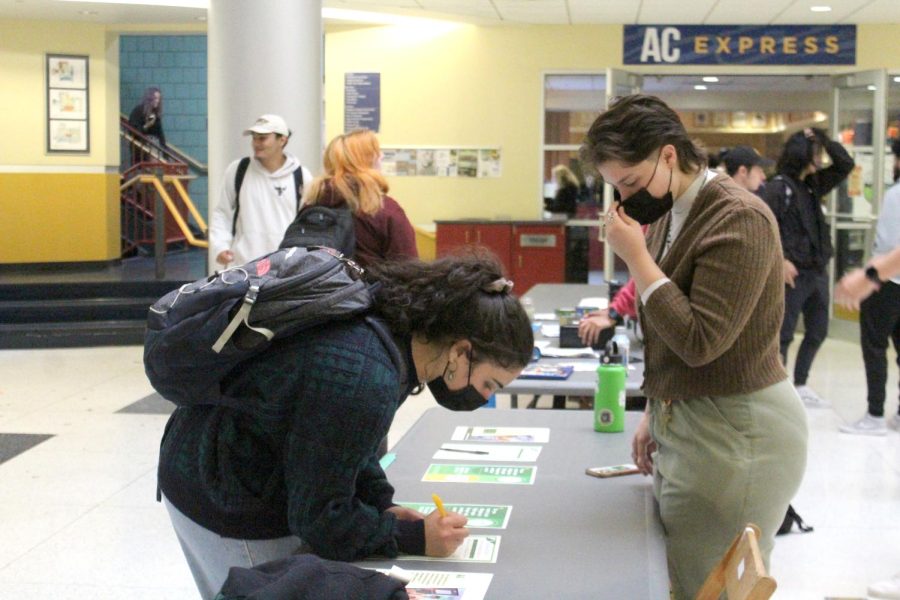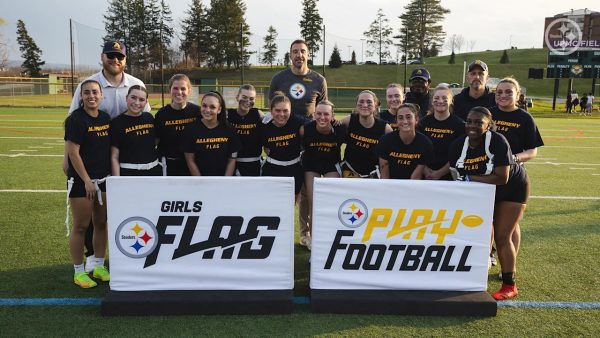Food recovery reborn
Pre-pandemic sustainability effort finds new life
Rachel Pieto, ’23, signs up for Allegheny’s chapter of the Food Recovery Network during tabling hosted by London Dejarnette, ’24, on Friday, Oct. 7.
Most food produced by Allegheny College’s kitchens winds up in students’ stomachs. What is not eaten by the end of the day is thrown into the college’s compost system and recycled into the Carr Hall Garden. One group — a revival of the Allegheny College chapter of the Food Recovery Network — is seeking to improve on this system by packing unused food and sending it to local community groups.
“As far as food waste management goes, the compost method is not terrible, but it is not closing a social feedback loop — meaning that the food could be serving a social purpose,” said London Dejarnette, ’24, the president of the revived FRN chapter. “It’s not (serving that purpose) when it’s being simply composted. Even though that is the green option, it doesn’t necessarily mean that it’s ethical or sustainable communally.”
According to Director of Sustainability Kelly Boulton, ’02, the problem Dejarnette is trying to solve is a byproduct of the way that Brooks Dining Hall plans for the amount of food needed per meal.
“They’ve got an educated guess (of how many students will eat each day), but they always have to plan for the most students that are going to come so they don’t run out of food,” Boulton said. “Unfortunately, there’s always going to be some food waste, so if we can find a way to find a second audience for that, then it’s not waste, it’s just shared.”
The FRN was founded in 2011 by students at the University of Maryland — College Park after they noticed extra dining hall food in the trash every night. In the 11 years since, the organization estimates it has donated just under 11 million pounds of food, or around 9 million meals.
Allegheny’s chapter of the FRN was started in 2013 and lasted until just before the pandemic hit in 2020, donating a total of 5,371 pounds over the seven-year period. Among the locations they delivered to was the Crawford County Mental Health Awareness Program.
“We would absolutely welcome the return of the program and would partner however is possible,” said CHAPS Executive Director Lynn McUmber.
McUmber said that recovered food would go to CHAPS’ Drop-In Center, a space she called the “cornerstone of our agency.” It is a support space open to all, with computers for an online connection, a pool table and programs and communal activities. On the weekends, CHAPS offers some meals as well.
“Meals are really important to help people with limited means,” McUmber said. “They’re also very important because many people with mental health challenges or housing challenges are alone, and eating alone and preparing meals alone usually is not very fun. It’s just much healthier for oneself to be able to break bread together and share.”
Pre-pandemic, excess food from Allegheny’s dining hall would support extra meals at the center up to two nights a week. The drop-in center’s kitchen would be able to store and reheat food for extended periods of time
“We have a nice kitchen and we have plenty of freezer space, so it’s always worked well,” McUmber said. “Usually, we sign some sort of a memo of understanding or a collaborative agreement … there’s always a manager on duty downstairs and they know to receive the food and put it in storage, and they know to give the students that deliver the now-washed containers — that’s all in place if it were to happen again. Hopefully we would be able to make a connection with whoever was coordinating it, as not a lot has changed here.”
According to Boulton, the key to the program’s pre-pandemic success was a few core students who were the program’s strongest supporters. These students kept in touch with where the food was going and provided transportation for the food. This model worked, so long as there were enough dedicated leaders to keep things going.
That supply of leaders seems to have run out by the 2018-19 academic year, when there were no recorded recoveries for the chapter — a far cry from the 908 pounds recovered in 2017-18. The last entry in the chapter’s records show that 236 pounds were donated in the fall semester of 2019 to CHAPS, St. James’ Haven and St. Agatha’s Church.
“This is for our first semester of Food Rescue, which we considered a success, due to the consistent hard work from our volunteers and our growing network of partner organizations,” state the notes for this last recovery.
Boulton attributed the lack of recovery to established leaders graduating.
“Of course, students turned over, and so even before the pandemic, the program had fallen apart just because there weren’t students who were committed to it in a systemic — maybe just more consistent way,” Boulton said. “So it was already kind of falling apart and then the pandemic of course, just put it to rest.”
When Dejarnette came to Allegheny in 2020, they said they reached out to Parkhurst General Manager Stephanie Lang about the program but were told the program was no longer possible. After the college switched dining providers on July 1, Dejarnette wrote to Aramark and found them far more willing to accommodate the food recovery effort.
Dejarnette is currently in the process of gathering volunteers and educating students about the recovery process. They said that a lot of the students who have signed up to volunteer their time for the program are members of the college’s Bonner Program, which offers students from low-income and first-generation backgrounds access to education. Bonner students receive a stipend equivalent to 10 hours of Federal Work-Study pay in exchange for 10 hours of community service at one of a few pre-designated “sites.” Allegheny Bonner students work at sites like the Center for Family Services, the Meadville Market House and the Tamarack Wildlife Center.
Dejarnette is currently working to have the FRN chapter count as a Bonner site, which they say is why so many Bonners are flocking to volunteer.
“I think that identifies more of an issue with Bonner right now, because both of the Bonner coordinators quit last year, and we have a completely new staff and they’re still trying to get acclimated to the entire system,” Dejarnette said. “A lot of students have not been placed with their sites yet, and so a lot of students are just eager to get a paycheck at this point.”
Boulton said that integrating the chapter with the Bonner program could help with some of the long-term consistency problems the program faced pre-pandemic.
“My sense is that that could help with the stability and the consistency of it going forward,” Boulton said. “We haven’t tested that theory, but I hope that it is integrated with the Bonner program. They could still recruit other volunteers, but those Bonners are already going, so it seems like we should build the program on what’s already existing.”
Dejarnette’s current plan is to take food into Meadville one night a week, using a combination of the chapter’s board and outside volunteers from Bonner and other programs that require service hours.
“What we see happening is that organizations that require service hours or sororities and fraternities, we could see them signing up for this — doing a week where they all come in and do this,” Dejarnette said. “What we’re hoping is that we just have like a group of students who, each week, come and help despite the fact that they have service hours to gain, or want Bonner hours.”
Next semester the program may extend to two nights a week if enough students volunteer, Dejarnette added.
“It’s just been a matter of making sure that everything internally is organized so that when we do start bringing in volunteers, it’s not unorganized and unimpactful,” Dejarnette said. “We want to make sure that we have everything internally organized prior to going to a community partner.”

Sami Mirza is a senior from many different places. He is majoring in International Studies with a focus on the Middle East and North Africa and minor in...












